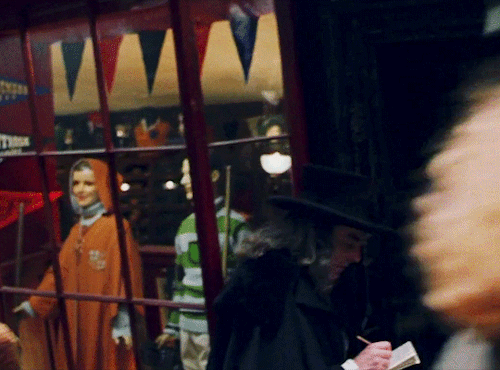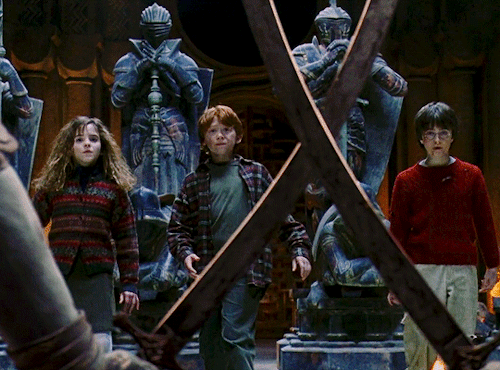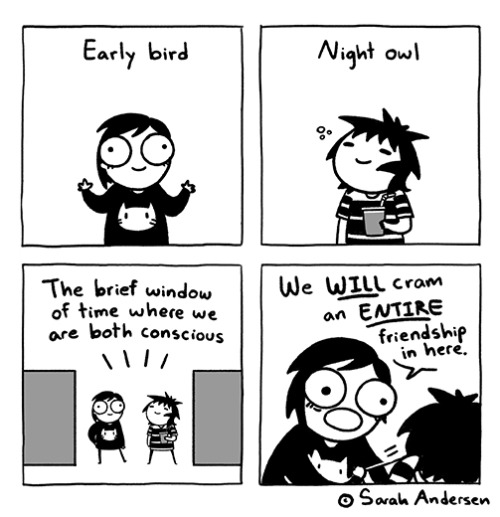Vcsupertramp - VC Supertramp

More Posts from Vcsupertramp and Others
Create your world around the time you are more productive. Daytime is not the best time for everyone!

via @extramadness
Lord of the Rings was published in the fifties, and largely written in the forties. Tolkien’s opinions on society and morality and technology are at some points genuinely more conservative than what I’m comfortable with. And yet, the more I think about it, the more sure I am that Tolkien actually deconstructs most of the clichéd fantasy tropes he supposedly originates. Some examples.
The long-lost heir is not the hero, he’s a side character who deliberately uses himself as a decoy.
The real hero actually fails in his quest, his goodness and determination and willpower utterly fail in the face of evil, and the world is saved by a series seemingly unrelated good deeds.
The central conflict is not between destroying the world and preserving it. An age of the world will come to an end, and many great and beautiful things will perish, whether the heroes win or lose. The past may have been glorious, but preserving it is impossible, and returning to it is impossible, time has passed and the world has moved on. The king returns, but the elves are gone and magic fades from the very substance of Middle Earth. The goal is not to preserve the status quo, the goal is the chance to rebuild something on the ruins.
Killing the main villain seems to instantly solve the problem, eradicate all enemies and fix the world, except it doesn’t, not wholly, since the scouring of the Shire still has to happen.
Also, the hero gets no real reward, and what he gets, he cannot really enjoy. He is hurt by his ordeal, and never fully recovers.
There is a team of heroes, a classic adventuring party, except the Fellowship is together for less one sixth of the series. The Fellowship is intact from the Council of Elrond to Gandalf’s death, four chapters. The remaining eight are together until Boromir’s death, an additional six chapters. This is nothing compared to LOTR’s length of sixty-one chapters, if I count correctly.
Tolkien is not classic high fantasy. If you actually think about it, there is very little magic. The hobbits’ stealth is not magical, most elven wonders are not unambigously magical, wizards are extremely rare, and even Gandalf hardly uses magic if you compare him to the average DnD wizard. Most magic is indistinguishable from craft, there is no clear difference between a magic armor and a very good armor, between magic bread and very good bread, between magical healing and competent first-aid plus a few kind words.
TLDR: Stop praising recent fantasy for deconstructing Tolkien if they’re “deconstructing” something Tolkien has never actually constructed.








It does not do to dwell on dreams, Harry, and forget to live. Harry Potter and the Sorcerer’s Stone (2001) Dir. Chris Columbus
Keep this in mind the next time you are about to repeat a rumor or spread gossip.
In ancient Greece (469 – 399 BC), Socrates was widely lauded for his wisdom. One day an acquaintance ran up to him excitedly and said, “Socrates, do you know what I just heard about Diogenes?”
“Wait a moment,” Socrates replied, “Before you tell me I’d like you to pass a little test. It’s called the Triple Filter Test.”
“Triple filter?” asked the acquaintance.
“That’s right,” Socrates continued, “Before you talk to me about Diogenes let’s take a moment to filter what you’re going to say. The first filter is Truth. Have you made absolutely sure that what you are about to tell me is true?”
“No,” the man said, “Actually, I just heard about it.”
“All right,” said Socrates, “So you don’t really know if it’s true or not. Now let’s try the second filter, the filter of Goodness. Is what you are about to tell me about Diogenes something good?”
“No, on the contrary…”
“So,” Socrates continued, “You want to tell me something about Diogenes that may be bad, even though you’re not certain it’s true?”
The man shrugged, a little embarrassed. Socrates continued, “You may still pass the test though, because there is a third filter, the filter of Usefulness. Is what you want to tell me about Diogenes going to be useful to me?”
“No, not really.”
“Well,” concluded Socrates, “If what you want to tell me is neither True nor Good nor even Useful, why tell it to me or anyone at all?”
The man was bewildered and ashamed. This is an example of why Socrates was a great philosopher and held in such high esteem.
It also explains why Socrates never found out that Diogenes was banging his wife.
reminder to myself about the process of drafting & revising:
first drafts are for making it exist
second drafts are for making it functional
third drafts are for making it effective
hey remember when jane austen, a woman, referred to a character named richard as having “never done anything to entitle himself to more than the abbreviation of his name” in 1817. yeah me too.
When you rediscover working with your headphones on



Conditioned to be passive consumers, we confuse submission with security, celebrate obedience as virtue, and consent to self-destructive routines of agonizing repression, all because we lack the courage to step outside the prison cells that we affectionately regard as “comfort zones”.
-
 bigbabybastian-blog liked this · 7 years ago
bigbabybastian-blog liked this · 7 years ago -
 sunslayer123-blog liked this · 7 years ago
sunslayer123-blog liked this · 7 years ago -
 redza82-blog liked this · 7 years ago
redza82-blog liked this · 7 years ago -
 dracolulpicguardian liked this · 7 years ago
dracolulpicguardian liked this · 7 years ago -
 shadowjinx626 liked this · 7 years ago
shadowjinx626 liked this · 7 years ago -
 kikideliverybooks liked this · 7 years ago
kikideliverybooks liked this · 7 years ago -
 dafcknexo-blog liked this · 7 years ago
dafcknexo-blog liked this · 7 years ago -
 misguided-romantic-scribble-blog liked this · 7 years ago
misguided-romantic-scribble-blog liked this · 7 years ago -
 madame--president liked this · 7 years ago
madame--president liked this · 7 years ago -
 greenentertainer-blog liked this · 7 years ago
greenentertainer-blog liked this · 7 years ago -
 foreverskyward-blog1 reblogged this · 7 years ago
foreverskyward-blog1 reblogged this · 7 years ago -
 foreverskyward-blog1 liked this · 7 years ago
foreverskyward-blog1 liked this · 7 years ago -
 ellawton972-blog reblogged this · 7 years ago
ellawton972-blog reblogged this · 7 years ago -
 ellawton972-blog liked this · 7 years ago
ellawton972-blog liked this · 7 years ago -
 littleflamefromyourass liked this · 7 years ago
littleflamefromyourass liked this · 7 years ago -
 galil-r-harper-blog reblogged this · 7 years ago
galil-r-harper-blog reblogged this · 7 years ago -
 itsrobm liked this · 7 years ago
itsrobm liked this · 7 years ago -
 rustysvision reblogged this · 7 years ago
rustysvision reblogged this · 7 years ago -
 flyinglettuce27-blog liked this · 7 years ago
flyinglettuce27-blog liked this · 7 years ago -
 carolisbethcp liked this · 7 years ago
carolisbethcp liked this · 7 years ago -
 jamtheradar-blog1 liked this · 7 years ago
jamtheradar-blog1 liked this · 7 years ago -
 devilking2138-blog liked this · 7 years ago
devilking2138-blog liked this · 7 years ago -
 nullandvoid93 liked this · 7 years ago
nullandvoid93 liked this · 7 years ago -
 2mwhit2 liked this · 7 years ago
2mwhit2 liked this · 7 years ago -
 sweetframe-blog1 liked this · 7 years ago
sweetframe-blog1 liked this · 7 years ago -
 marshmegxo-blog liked this · 7 years ago
marshmegxo-blog liked this · 7 years ago -
 bitgurlbleu liked this · 7 years ago
bitgurlbleu liked this · 7 years ago -
 celakupferer liked this · 7 years ago
celakupferer liked this · 7 years ago -
 dumbdumb321-blog reblogged this · 7 years ago
dumbdumb321-blog reblogged this · 7 years ago -
 vcsupertramp reblogged this · 7 years ago
vcsupertramp reblogged this · 7 years ago -
 vcsupertramp liked this · 7 years ago
vcsupertramp liked this · 7 years ago -
 deekdeek1997 liked this · 7 years ago
deekdeek1997 liked this · 7 years ago -
 y00ngledoongle liked this · 7 years ago
y00ngledoongle liked this · 7 years ago -
 thisisnotwendy reblogged this · 7 years ago
thisisnotwendy reblogged this · 7 years ago -
 thisisnotwendy liked this · 7 years ago
thisisnotwendy liked this · 7 years ago -
 axel-i-havedropped-my-crois-blog liked this · 7 years ago
axel-i-havedropped-my-crois-blog liked this · 7 years ago -
 whatoncewasme liked this · 7 years ago
whatoncewasme liked this · 7 years ago
Wanderer, there is no way, you make the way as you go... Just a wanderer enjoying the rollercoaster.
176 posts

